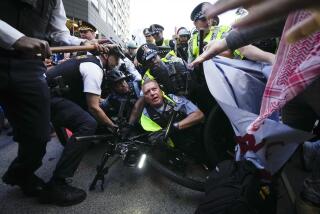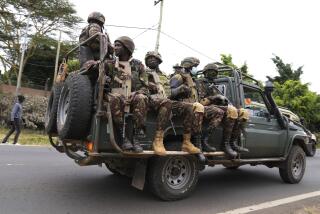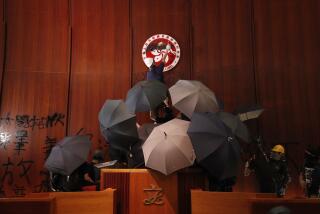WTO Protests in Hong Kong Turn Violent
- Share via
HONG KONG — Chaos broke out in the streets of Hong Kong on Saturday as anti-globalization demonstrators battled riot police in the most violent protests here since the former British colony was handed over to Chinese rule in 1997.
More than 100 people were reported injured in the melee. Police detained or arrested about 900 demonstrators, many of them South Korean farmers who have been leading the weeklong protests as the World Trade Organization meets here.
The farmers had vowed to make their voices heard inside Hong Kong’s convention center, where government ministers from 149 nations have been struggling to negotiate a trade accord. Earlier in the week, the South Koreans, angered about the opening up of their country’s rice market, at one point even jumped into the bay in a bid to reach the heavily fortified convention area.
But things escalated Saturday, as demonstrators charged police lines using bamboo poles, stepladders and metal rails to beat back guards. Protesters hurled rocks and tried to overturn a police vehicle. Police hit back with their batons and fired pepper spray and tear gas.
As darkness fell on a cold, gusty night, some protesters broke through police cordons, getting within a few buildings of the convention center in the Wanchai area.
Authorities closed nearby roads, a tunnel leading into Hong Kong Island from Kowloon as well as subway stops, paralyzing a large section of downtown Hong Kong and causing a near-panic inside the convention hall, which was briefly locked.
“I was definitely scared for my safety,” said Azubuike Ishiekwene, 40, a journalist from Nigeria. “I would have thought the lack of progress in the negotiations would have been of some comfort to the demonstrators.”
Just before midnight, Hong Kong’s police commissioner, Dick Lee Ming-Kwai, issued a statement saying that order had been restored. But hundreds of protesters staged a sit-in in the Wanchai area and authorities dispersed the crowds in the wee hours, taking some of them away in a police bus.
The police said 107 people, including some police officers, were taken to the hospital; 90 of them were treated and released.
A police spokeswoman said two more protests were expected this afternoon as the WTO wrapped up its conference.
Hong Kong officials had been preparing for months for possible disturbances during the WTO meeting, given previous street actions at global trade meetings in Seattle and Cancun, Mexico. Hong Kong is no stranger to demonstrations -- tens of thousands took to the streets two weeks ago to press for more democratic reforms -- but protests here generally have been peaceful.
The rioting was almost certainly closely watched by the central government in Beijing, which has been struggling with widespread protests in the mainland. Mainland residents said there was no television or radio coverage of the Hong Kong demonstrations Saturday.
“The central government might have concerns about local democracy or anti-China activists taking advantage of this meeting to organize these activities,” said Shi Yinghong, a professor of international relations at People’s University in Beijing.
For all the drama outside, there was little in the way of progress inside the convention hall. Nearly 6,000 delegates had gathered here to work on a framework for reducing trade barriers in a manner that would help developing countries.
But with less than a day to go in the talks, negotiators were still struggling to reach an agreement on some modest, scaled-back objectives.
The WTO had originally hoped that its members could agree on formulas for reducing subsidies, tariffs and other trade barriers for agricultural and industrial goods. But key differences between rich and poor nations, and in particular a wide gulf between the U.S. and European Union over farm subsidies, have frustrated negotiations and jeopardized the WTO’s goal of crafting a new trade accord by the end of next year.
Times researcher Cao Jun in Shanghai contributed to this report.
More to Read
Sign up for Essential California
The most important California stories and recommendations in your inbox every morning.
You may occasionally receive promotional content from the Los Angeles Times.











